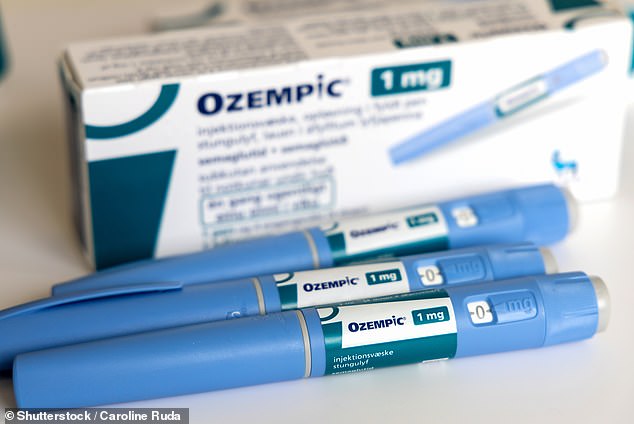Ozempic maker Novo Nordisk has cut its sales and profit forecasts amid a surge in copycat weight-loss drugs.
The Danish pharmaceutical giant, which also makes Wegovy, fell victim to ‘compounding’ – a practice in the US that allows pharmacies to produce replicas.
Compounders were given the green light by American authorities in 2022 due to a shortage of Ozempic, Wegovy and rival Eli Lilly’s Zepbound.
But Novo’s shares jumped as it beat profit expectations in the first half of the year ahead of a ban on the copycat drugs later this month.
Booming sales of Wegovy helped make Novo the most valuable listed company in Europe in 2024.
It was worth around £460billion in June, but its market value has since halved.

Copycat drugs: Ozempic maker Novo Nordisk, which also makes Wegovy, has fallen victim to ‘compounding’ – a practice in the US that allows pharmacies to produce replicas
Prescriptions in the US, its biggest market, have not grown since February despite Novo having increased supplies.
Around a third of the American obesity drug market has been ‘captured’ by compounding pharmacies, chief executive Lars Fruergaard Jorgensen said yesterday, dampening growth in the US.
‘It’s unprecedented in our industry to have very large volumes of products flowing to patients that are not approved,’ he said. ‘We were really surprised about that.’
Jorgensen added that growth ‘is expected to pick up in the second half of the year’.
But Derren Nathan, an analyst at Hargreaves Lansdown, said: ‘There’s a clampdown on compounders, but question marks remain over its enforcement. The end of the shortage also raises questions about the health of US demand.
‘That’s also reflected in Novo’s deal last week with a US healthcare provider to provide Wegovy to patients at a discounted rate.’
Yesterday, the drug maker cut its annual sales and profit forecasts for the first time since the launch of Wegovy four years ago.
It expects sales to grow between 13 per cent and 21 per cent, compared to the 16 per cent to 24 per cent range given earlier this year.
Profits are forecast to grow by between 16 per cent and 24 per cent in 2025, compared to previous guidance of 19 per cent to 27 per cent.
Potential new taxes on pharmaceuticals, imposed by President Donald Trump, could have a negative impact, it said.
Sales rose 18 per cent year-on-year to £8.9billion between January and March. Operating profits increased 20 per cent to £4.4billion. The shares rose 1.3 per cent.
DIY INVESTING PLATFORMS

AJ Bell

AJ Bell
Easy investing and ready-made portfolios

Hargreaves Lansdown

Hargreaves Lansdown
Free fund dealing and investment ideas

interactive investor

interactive investor
Flat-fee investing from £4.99 per month

InvestEngine

InvestEngine
Account and trading fee-free ETF investing
Trading 212
Trading 212
Free share dealing and no account fee
Affiliate links: If you take out a product This is Money may earn a commission. These deals are chosen by our editorial team, as we think they are worth highlighting. This does not affect our editorial independence.
This article was originally published by a www.dailymail.co.uk . Read the Original article here. .

